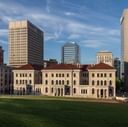
Oklahoma’s practice of automatically housing death-row prisoners in solitary confinement and denying them communal religious services is unconstitutional and inhumane, a coalition of national and local civil rights organizations says. In a July 29, 2019 letter to interim Oklahoma Department of Corrections (ODOC) director Scott Crow, the coalition — headed by the American Civil Liberties Union of Oklahoma—reported that its two-year investigation into the state’s housing of death-row prisoners revealed conditions that were “dangerous and injurious.” The group issued a formal demand that the ODOC change the conditions of death-row confinement — a precursor to filing a federal lawsuit— but offered to work with prison officials to “avoid the expense and delay of protracted litigation.”
Oklahoma death-row prisoners are housed in the H‑Unit of the Oklahoma State Penitentiary (pictured) in McAlester in what the rights groups characterize as “inhumane and oppressive conditions.” ODOC’s “policies that automatically sentence condemned people to permanent solitary confinement,” they say, “raise serious constitutional, human rights, and human dignity questions.” The groups’ letter provides a detailed description of confinement on McAlester’s death row. “The condemned men,” they say, “are locked in their cells 22 to 24 hours a day. By policy they are offered a 15-minute shower three times a week and one hour of solitary exercise five times a week in an enclosed concrete room of 20 feet by 20 feet that has an opaque skylight-ceiling that obstructs any view of the sky or sun. People with approved family visitors may have noncontact visits on Fridays and weekends, behind plexiglass and over a phone. The facility offers no form of congregate activity or time outside of cells, with no programs, educational services, or work opportunities.”
Death-row conditions similar to those in Oklahoma have been challenged in court in Arizona, South Carolina, and Virginia, prompting those states to end their policies of routinely keeping all death-row prisoners in solitary confinement. “Multiple states have had success mainstreaming death-sentenced people or eliminating automatic solitary confinement for them, including Missouri, North Carolina, Colorado, Arizona, and Virginia,” said Donald Specter, Executive Director of the non-profit Prison Law Office, which advocates for constitutional conditions in prisons, jails, and juvenile halls. “There is no reason Oklahoma cannot do the same.”
Solitary confinement has well-documented debilitating mental health effects, and the letter describes some of the consequences of Oklahoma’s policies. “One condemned man we met with described his indefinite confinement in H‑Unit as being ‘buried alive,’” the letter states. “The inhumane and oppressive conditions in H‑Unit have led to suicides and suicide attempts, most recently in June 2018 when a death-sentenced man died by suicide.” In a recent four-year span between 2012 and 2015, the letter reports, “nine prisoners at OSP-McAlester died by suicide, giving the prison the highest suicide rate in the state, six times higher than the prison with the second highest rate. OSP’s suicides in those four years represented 35% of all suicides of people in DOC custody, even though OSP houses only three percent of the state’s prisoners.”
Megan Lambert, a legal fellow at the ACLU of Oklahoma, said, “Studies have shown that long-term isolation exacerbates mental illness —or even causes it in those who were healthy when they entered solitary. The men in H‑Unit are suffering due to the years they spend there —their minds and bodies are irreparably damaged by the inhumane use of solitary confinement as they wait for the State to overturn their conviction or execute them. This policy is needlessly cruel, serves no purpose, and flies in the face of the Constitution.”
The rights groups also argue that Oklahoma’s denial of “congregate religious services” violates federal law. Under the Religious Land Use and Institutionalized Persons Act, the government may not impose a “substantial burden” on the religious exercise of prisoners without a compelling government interest. Oklahoma allowed communal worship services on death row prior to 2009, without incident.
Grant Hermes, Legal Groups Say Okla. Death Row Unconstitutional, News9, August 5, 2019; Press Release, ACLU OF OKLAHOMA AND PARTNERS DEMAND HUMANE TREATMENT FOR THOSE AT MCALESTER PENITENTIARY, ACLU of Oklahoma, July 29, 2019; Letter, RE: Conditions for Death-Sentenced People Incarcerated at H‑Unit, ACLU of Oklahoma, July 29, 2019.



